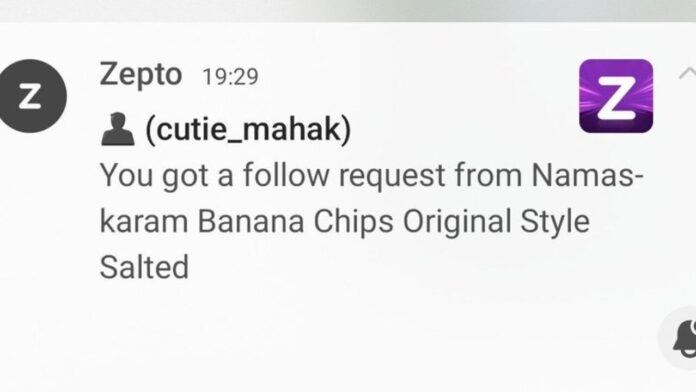Zepto Faces Backlash for Inappropriate Notifications: A Case of Crossing the Line in Customer Communication
Zepto, a quick-commerce platform known for its promise of delivering essential items within 10 minutes, recently found itself embroiled in controversy after sending an unsolicited and inappropriate push notification to a customer. The incident occurred when Mahak Verma, a resident of Bengaluru, received a message from Zepto that addressed her as “cutie.” The bizarre notification was intended to promote a brand of banana chips, but the personal and unprofessional tone of the message left Verma feeling uncomfortable and outraged.
The notification, which appeared on Verma’s phone one evening, was titled “cutie_mahak” and read, “You got a follow request from Namaskaram Banana Chips Original Style Salted.” Verma, shocked by the message, took to LinkedIn to voice her concerns. In her post, she expressed her disappointment with the platform, stating that it was completely unacceptable for a well-known brand to address a stranger using such a personal and familiar term.
“Yesterday I received a push notification from Zepto which very conveniently addressed me as ‘Cutie_mahak!’ and suddenly it brought along all the terrible instances that all teenage girls in India go through,” Verma wrote in her LinkedIn post. She went on to explain that in today’s world, where women’s safety is a major concern, and in an era where companies are expected to adhere to strict guidelines like the Prevention of Sexual Harassment (POSH) Act, it was particularly disturbing to receive such a message from a brand. Verma questioned how a company could find it appropriate to refer to a random customer with such a term, especially when there was no context or prior relationship between them.
In her post, Verma highlighted that safety and respect for women start at home, and brands have a responsibility to ensure their communication with customers reflects those values. She emphasized that while the message may seem harmless to some, it is the underlying casualness of such language that can perpetuate a culture where women feel unsafe or disrespected. Verma also noted that when she shared a poll about the notification on Instagram, some of her friends felt that she was overreacting. However, she stood by her concerns, pointing out that the issue is not about the term itself but about the inappropriateness of brands using such language with customers they do not know personally.
This was not the first time Zepto faced criticism for inappropriate notifications. In a separate incident, the company sent another unsolicited promotional message to a different woman in Bengaluru, this time involving a sensitive subject. The notification, intended to promote a contraceptive pill, read, “I miss you, Pallavi. Says i-Pill emergency contraceptive pill,” accompanied by three teary-eyed emoticons. The recipient of the message, Pallavi Pareek, was left shocked and deeply disturbed by the tone and content of the notification.
Pallavi, like Mahak Verma, took to social media to share her experience and question Zepto’s ethical standards. The message, which seemed to trivialize a serious topic like contraception, sparked outrage among many users who felt that the company had crossed a line. Zepto quickly responded to Pallavi’s post with an apology, acknowledging their mistake. “Hey Pallavi, we messed up, and we’re truly sorry. We understand how thoughtless and potentially harmful this was,” the company stated in their response on LinkedIn.
These incidents have raised questions about the marketing practices employed by companies like Zepto. As the world becomes increasingly digital, brands are constantly seeking new ways to engage with their customers through personalized messaging. However, there is a fine line between personalization and over-familiarity, and when that line is crossed, it can lead to discomfort and outrage, as demonstrated by these incidents.
Both Mahak Verma and Pallavi Pareek’s experiences highlight the need for companies to exercise greater caution when crafting their promotional messages, especially when addressing sensitive issues or sending communications to female customers. The use of casual or overly familiar language, particularly when there is no prior relationship between the brand and the customer, can lead to unintended consequences. In today’s world, where brands are expected to uphold high ethical standards, incidents like these serve as a reminder that customer interactions should always prioritize respect and professionalism.
Zepto’s apology in the case of Pallavi was a step in the right direction, but it also underscores the importance of brands taking proactive measures to prevent such missteps in the future. As customer outrage grows over inappropriate messaging, companies must rethink their marketing strategies to ensure that their communications are both thoughtful and respectful, fostering trust rather than alienating their user base.



